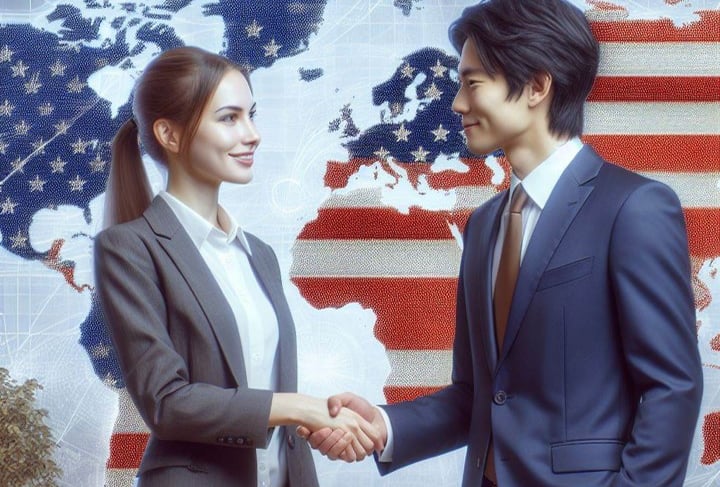Bridging the Gap: How to Overcome Cultural Barriers in Negotiation
Cultural barriers can be intimidating in Negotiations. Understand the reasons for the barrier, and strategies to overcome cultural barriers in negotiation.
TRUSTRELATIONSHIPSCULTUREART OF NEGOTIATIONNEGOTIATION SKILLS
Ashish Mendiratta
1/3/20245 min read
A Short Story (Part I)
In busy Tokyo, where bright neon lights fill the night sky with colors, Mia from New York and Hiroshi, a reserved Japanese businessman, faced a crucial moment. They were about to start a negotiation that would reshape their careers. Little did they realize that this meeting would reveal the complex challenges of cultural differences in negotiations.
It all began one rainy afternoon at a global business conference. Mia, known for her assertiveness and direct communication style, found herself intrigued by the mystique surrounding Hiroshi. She approached him after a panel discussion, curious to explore a potential collaboration between their companies. However, as they exchanged initial pleasantries, the cultural gap became apparent. Mia, with her firm handshake and piercing eye contact, unintentionally created a moment of discomfort for Hiroshi, whose cultural background dictated a more reserved and subtle approach. The stage was set for a negotiation that would require the navigation of cultural nuances.
This is a common scenario that many entrepreneurs face when negotiating with clients from different cultures. Cultural barriers can lead to misunderstandings, misinterpretations, and ultimately, failed negotiations. However, there are ways to overcome these barriers and negotiate successfully. Negotiation is a crucial aspect of business, and it is essential to be aware of the cultural differences that can arise during the process. In this blog, we will explore how to overcome cultural barriers in negotiation.
Identifying Cultural Barriers
Before we dive into strategies for overcoming cultural barriers in negotiation, it is important to understand the various barriers that may arise:
Language and Communication: Differences in language proficiency and communication styles can lead to misunderstandings and confusion during negotiations.
Non-Verbal Communication: Gestures, body language, and facial expressions can vary greatly across cultures, leading to misinterpretations.
Values and Beliefs: Cultural values and beliefs shape individuals' perceptions and priorities, influencing negotiation strategies and outcomes.
Etiquette and Protocol: Different cultures have distinct rules and expectations regarding proper etiquette and protocol, which can impact the negotiation process.
Attitude towards Hierarchy: Hierarchy is viewed differently across cultures. In some cultures, hierarchy is highly valued, while in others, it is less important.
Risk-Taking: Risk is viewed differently across cultures. Some cultures are more risk-averse, while others are more comfortable with risk.
Value of Relationship: Relationships are viewed differently across cultures. In some cultures, building a relationship is essential before doing business, while in others, business comes first.
Decision-Making Styles: Cultures may have different approaches to decision-making, with some valuing consensus while others prioritize hierarchy and authority.
Strategies for Overcoming Cultural Barriers
Now that we have identified some common cultural barriers, let's explore strategies to overcome them:
1. Cultivate Cultural Awareness
Developing cultural awareness is crucial for effective negotiation. The first step is to do your homework about the other party’s culture. Take the time to educate yourself about the cultural norms, values, and communication styles of your counterparts. Research their customs, rituals, and taboos. Don’t overlook your suppliers as sources of information about their culture - they will usually welcome your interest. This will help you understand their value system and construct a problem-solving conversation about any difficulties that unfamiliar customs pose. Also, it will enable you to understand their perspectives and adapt your approach accordingly.
2. Build Trust and Rapport
Establishing trust and rapport is essential in any negotiation. In cross-cultural negotiations, investing time in building relationships is even more important. Establishing trust breaks down stereotypes and biases that may exist based on cultural preconceptions. This can be achieved through active listening, showing respect, and demonstrating a genuine interest in the other party's culture. Trust and rapport demonstrate a genuine respect for cultural differences. When negotiators take the time to understand and appreciate each other's backgrounds, values, and communication styles, it fosters an environment of cultural sensitivity.
3. Adapt Communication Styles
Recognize that communication styles may differ across cultures. Be mindful of your communication style and adapt it to suit the preferences of your counterparts. Using direct, open, and assertive communication may be appreciated in certain cultures while it may be perceived as cold & discourteous in other cultures. Some value verbal acknowledgment, while others may rely on non-verbal cues. Adapting communication styles involves incorporating active listening techniques that align with the cultural norms of the negotiating parties. Use clear and concise language, avoid jargon, and be patient in ensuring mutual understanding.
4. Seek Common Ground
Seeking common ground is a powerful strategy for overcoming cultural barriers during negotiations. It involves identifying shared interests, values, or goals that can serve as a foundation for mutual understanding and collaboration. Look for areas where both parties can benefit and emphasize collaboration rather than competition. By focusing on commonalities, negotiators can bridge cultural gaps and create a framework for successful communication and cooperation. This approach helps to build trust and facilitates the resolution of cultural differences.
5. Embrace Flexibility and Compromise
Be open to compromise and demonstrate flexibility in your negotiation approach. Recognize that cultural differences may require adjustments to your initial expectations. By adapting to different communication styles, respecting time sensitivity, adjusting the decision-making process, and balancing assertiveness and compromises, one can transcend cultural barriers. By showing a willingness to adapt, you can create an environment that encourages cooperation and problem-solving.
6. Engage Cultural Interpreters
In complex negotiations where language and cultural barriers are significant, consider engaging the services of cultural interpreters. These professionals can help bridge the gap by facilitating communication, preventing misunderstanding, and ensuring accurate interpretation of language between both parties.
The Short Story (Part II)
Realizing the cultural barriers to effective communication, Mia and Hiroshi engaged in open conversations, unraveling the values and customs shaping their respective communication styles.
In Tokyo, amidst the serenity of a traditional tea ceremony, Mia and Hiroshi discovered the subtle wavelength required for negotiation harmony. The ceremony reflected the importance of patience and understatement, values Mia embraced while Hiroshi appreciated Mia's directness in tabling the key issues. Hierarchy, deeply ingrained in Japanese culture, influenced the negotiation dynamics. Mia realized it and adapted her approach to give due respect to the seniority of Hiroshi while communicating.
Mia learned the strength in silence, while Hiroshi explored a more expressive form of communication. The negotiation table transformed into a space for storytelling, fostering a deeper connection through shared anecdotes and cultural narratives. Facing unforeseen challenges, Mia and Hiroshi embraced flexibility in their negotiation strategies. Adapting to the evolving negotiation landscape, they incorporated elements from each other's cultures into their approaches. The negotiation ceased to be rigid, evolving into a dynamic exchange that mirrored the fluidity of their evolving partnership.
Mia and Hiroshi's journey teaches us that negotiation is not a battle but a nuanced dance where diverse rhythms harmonize. Overcoming cultural barriers requires a commitment to understanding and appreciating different perspectives. As we navigate the intricate world of global business, let Mia and Hiroshi's story guide us towards negotiation not as a clash of cultures but as a celebration of unity.


Subscribe
Contact:
P2/54 DLF Phase 2 Gurugram 122002
contact@advanchainge.com
+91-9873829286
deepak.nande@advanchainge.com
+91-9820291969


